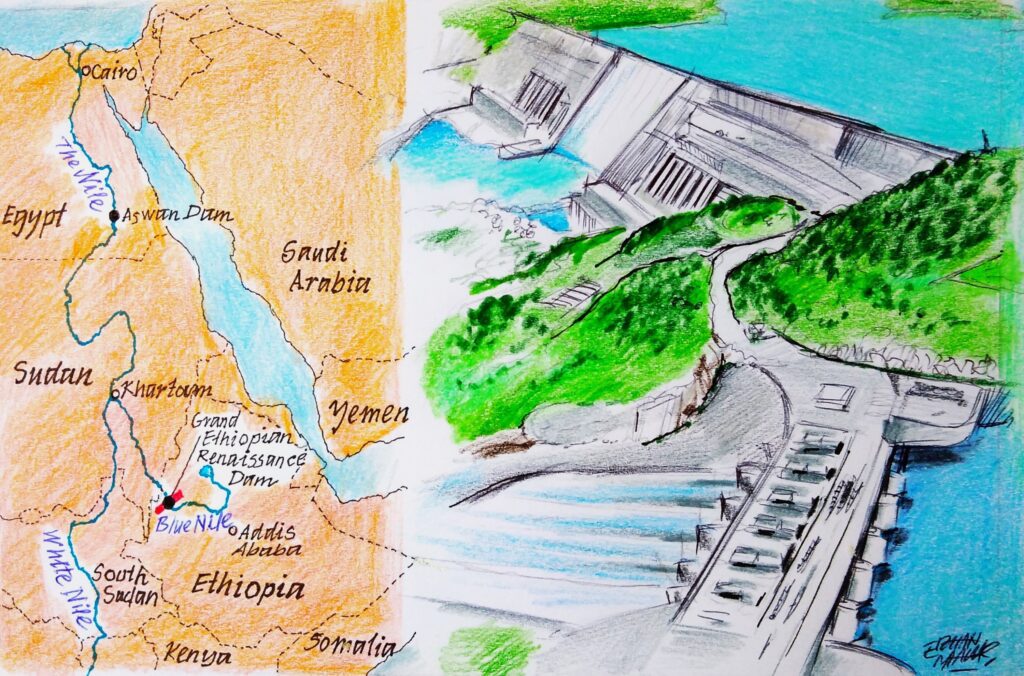Trump adviser Massad Boulos urges a “technical, not political” path to resolve the GERD dispute—marking a quiet shift in Washington’s stance toward Ethiopia and Egypt.
The United States has struck a noticeably softer and more pragmatic tone on the Grand Ethiopian Renaissance Dam (GERD), signaling a potential policy reset on one of Africa’s most contentious geopolitical issues.
In an interview with Al Arabiya Arabic, U.S. President Donald Trump’s Senior Adviser for African, Arab, and Middle Eastern Affairs, Massad Boulos, said the GERD dispute “must be resolved through technical means, not political pressure.” His remarks represent a sharp departure from the previous U.S. administration’s posture, which had tilted strongly toward Cairo’s position during Trump’s first term.
“We are working to find a solution suitable for all parties, especially on the technical side, as it is purely a technical matter that must be resolved in a technical way,” Boulos said, adding that the project “is now a reality” whose future “must be managed within that reality.”
For Ethiopia, the statement is likely to be welcomed as long-overdue acknowledgment that the $4.8 billion hydropower project on the Blue Nile has entered a new phase — one where cooperation is more practical than confrontation. For years, Ethiopia has argued that the GERD is primarily a development and energy project, not a political weapon, and that disputes should be handled through scientific and engineering dialogue among the three basin states: Ethiopia, Egypt, and Sudan.
A Reversal from Trump’s Hard-Line Rhetoric
Boulos’ remarks contrast sharply with former President Trump’s controversial statement in 2020 that “Egypt could bomb the dam,” a comment widely condemned in Addis Ababa as inflammatory and colonial in tone. Washington’s previous mediation efforts, led by the U.S. Treasury and the World Bank, were seen by Ethiopia as biased toward Egypt’s historic claims of “natural and acquired rights” over the Nile waters — claims rooted in colonial-era treaties Addis Ababa never recognized.
Since the dam’s completion and inauguration, however, U.S. rhetoric has noticeably shifted. Boulos’ framing of the GERD as a “technical reality” rather than a political crisis underscores Washington’s pragmatic recognition that Ethiopia has achieved what generations of leaders sought: the hydropolitical rebalancing of the Nile Basin.
“The issue is a matter of life and death for Egypt, Sudan, and Ethiopia,” Boulos said. “But the project is now a reality — any path forward must be found within this reality.”
Hydropolitics and a New African Water Order
The shift in tone comes amid broader changes in Africa’s water politics, as outlined by the Institute for Security Studies (ISS) in a recent Washington-based analysis titled “Water Wars: Has GERD Reset Africa’s Hydropolitics?”
According to ISS, Ethiopia’s completion and inauguration of the GERD — coinciding with the second African Climate Summit — marked not only an engineering milestone but also a symbolic reordering of Nile power dynamics. For millennia, Egypt held near-exclusive control over the river’s downstream flows, while upstream states like Ethiopia lacked the means or political leverage to harness its potential.
“GERD has induced a hydropolitics shift that could either exacerbate tensions and conflict, or lead to better security architecture in the Nile Basin and, because of its significance, in Africa as a whole,” the report notes.
By generating over 5,000 megawatts of clean power, Ethiopia has positioned itself as a regional energy hub, exporting electricity to neighboring countries like Kenya and Djibouti. The ISS analysis suggests that, beyond power generation, the GERD’s existence forces a reconsideration of colonial-era water arrangements that excluded most upstream African states.
From Water Wars to Water Cooperation
The Nile’s transformation from a symbol of domination to one of potential interdependence could hold lessons for the rest of Africa. As the ISS warns, water scarcity is becoming the continent’s next great security challenge, with over 400 million people lacking access to safe water. Climate change, population growth, and fragmented governance threaten to turn rivers into flashpoints — unless countries invest in cooperative, sustainable water-sharing frameworks.
In that sense, Washington’s call for a “technical” resolution is more than diplomatic language. It aligns with a growing recognition that science-driven cooperation — not political coercion — is the only viable path toward shared water security. If sustained, this could mark a new chapter in U.S.–Africa relations — one where the world’s superpower supports African-led frameworks rather than perpetuating inherited colonial hierarchies.
A Window for Pragmatism
For now, the U.S. appears to be treading carefully. Boulos described Egypt and Ethiopia as “nations bound by historical ties that should not lead to conflict,” confirming continued diplomatic communication with both capitals. He also hinted that Trump, if re-elected, would seek to personally mediate between Egyptian President Abdel Fattah el-Sisi and Ethiopian Prime Minister Abiy Ahmed — though under very different terms than before.
Whether that mediation materializes or not, the tone has clearly shifted. The GERD is no longer treated as a speculative or reversible project — it is a fact on the ground, and diplomacy is slowly catching up to that reality.
For Ethiopia, this recognition is validation of a decade-long struggle to define its own development path. For Egypt, it is an opportunity to pivot from zero-sum rhetoric toward modern water diplomacy. And for the U.S., it may be the start of a more mature engagement with Africa — one that treats its disputes not as proxy battlegrounds but as laboratories for sustainable cooperation.
